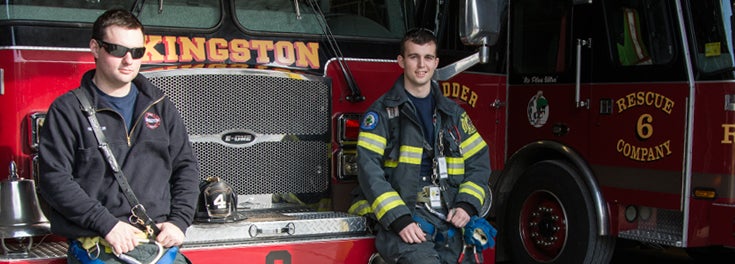 When the bell rings at the Kingston Fire Station alerting the volunteers to a fire, car accident or other emergency, many of those responding to the call are URI students. They don the equipment, drive the trucks, fight the fires, and provide medical assistance as needed. And they’re crucial members of the team.
When the bell rings at the Kingston Fire Station alerting the volunteers to a fire, car accident or other emergency, many of those responding to the call are URI students. They don the equipment, drive the trucks, fight the fires, and provide medical assistance as needed. And they’re crucial members of the team.
According to Deputy Chief Chris DeGrave, the students are a critical component of the station’s manpower. He calls them motivated, intelligent, and dedicated volunteers. And at least one student responds to every one of the approximately 800 emergency calls the station receives every year.
“Whether they want a career in public safety or not, being a volunteer firefighter provides an opportunity like none other on campus,” said Deputy Chief DeGrave. “It builds camaraderie, leadership, and teamwork skills. It gives you an opportunity to be much bigger than yourself. It’s something that will live with you in any job you do anywhere in the world.”
Being a volunteer firefighter provides an opportunity like none other on campus. It’s something that will live with you in any job you do anywhere in the world.
Student volunteers undergo 10 months of training—usually during the fall and spring of their freshman or sophomore year —before they become full-fledged firefighters. They learn how to work with ladders, how to ventilate a building, how to enter and exit windows, carry people out of burning structures, operate hoses, drive trucks, and much more.
“You don’t get more experience jammed into one year of your life than you do at the fire station,” said Don Seymour, a sophomore political science major. “We’re known throughout New England for our excellent training and operations. I’ve had more training here than an average full-time department does in five years.”
More than half of the firefighters who volunteer at the station are URI students, and every year six or seven students live at the fire station full time, receiving free housing in return for their service to the fire district. “I like to think that living at the firehouse isn’t much different from living in a house with a bunch of friends, just every now and then the bells go off and we go on a call,” said Justin Sweeney, a junior communication studies major, standing in his private room at the station. “Firefighting is what I love to do, and by living at the station I’m always surrounded by it.”
Students who complete the training may also earn internship or community service credits at the firehouse by working on special projects.
Regardless of what role you play, serving as a volunteer firefighter at the Kingston Station will get your adrenalin pumping. Justin recalls responding to an auto accident that required cutting down tree limbs, cutting open one of the vehicles, and winching a door open to save an injured driver. “It was a call where all of our training paid off and showed that we aren’t just another bunch of college kids,” he said. “I’m really fortunate to be just 20 years old and to know what I want to do with my life and be doing it already.”
